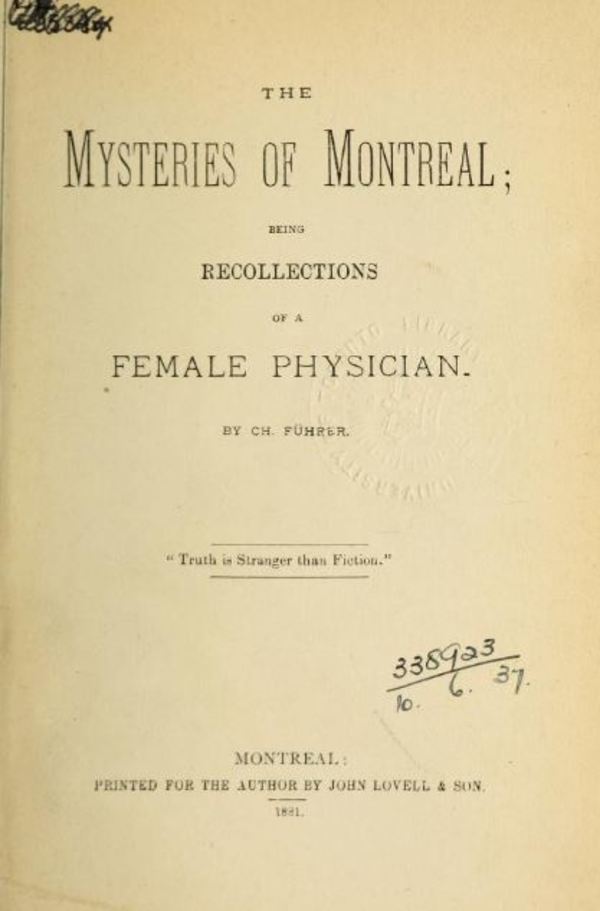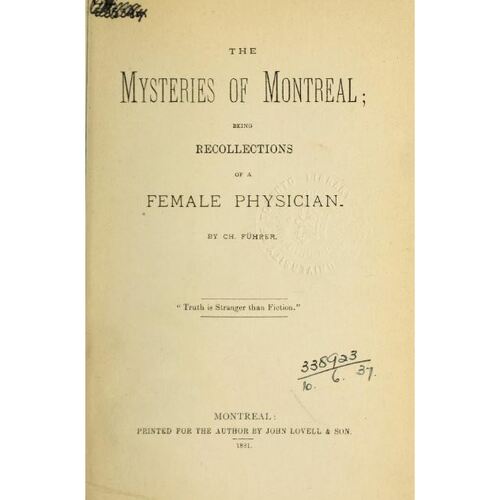
Source: Link
HEISE, CHARLOTTE (baptized Johanne Louise Charlotte) (Führer), midwife and author; b. 1834 in Hanover (Germany); m. 1853 Ferdinand Adolph Führer, and they had six children; d. 5 Nov. 1907 in Montreal.
Charlotte Heise’s father, who was reportedly an officer in the Hanoverian army, died when she was an adolescent; consequently, at age 17 Charlotte began work as a governess. After her marriage she and her husband immigrated to New York, but when her husband’s business failed the Führers returned to Germany. Taking the family’s financial welfare into her own hands, Charlotte decided to become a midwife. The Führers hoped to recross the Atlantic and she reasoned that North American women, turning ever increasingly to doctors for maternity care, would in fact prefer not to sacrifice their modesty if they had a trained, experienced midwife to attend them. She claimed to have received a diploma from the University of Hamburg after two years of study, but the only certainty is that she trained at a maternity hospital in Hamburg under a physician who specialized in obstetrics. After the completion of her studies the family immigrated once more, arriving in Montreal during the summer of 1859.
Führer served as a midwife in Montreal from about 1859 until shortly before her death. It was a pivotal time in the history of obstetrics in Montreal, a period which saw the gradual transformation of the birth process from a natural event to be assisted by a midwife to a medical one requiring the education and expertise of a physician. The city’s medical profession took steps to transfer even uncomplicated childbirth from the domain of the midwife into its own hands. Although Führer insisted that she was on good terms with Montreal’s physicians as a whole – implying that they accepted her and her profession – there is evidence of at least one note of discord. In 1881 the McGill College medical faculty became aware of an advertisement in which Führer claimed to be a licentiate of theirs, and the registrar was instructed to ask her to retract this statement from the advertisement.
Führer appears to have had a flourishing practice. Aside from attending women who gave birth in their own homes, she ran a maternity residence where women could spend the last few weeks of their pregnancy and bear their children. By her own account, Führer’s patients included women from the labouring and middle classes, married and unmarried. When the child was illegitimate Führer was at times charged with handing it over for adoption or placing it in an orphanage.
Until the early 1880s, if not later, Führer apparently served in dual capacity: in addition to acting as a midwife, she seems to have been confessor and confidante to women who found themselves in compromising circumstances, either as unmarried mothers or as wives pregnant by men other than their husbands. In this regard she was typical of midwives, and reflected Victorian sexual morality; in at least one maternity hospital operating in Montreal during the same period, the role of midwife clearly included a commitment to return errant women to lives of virtue.
Führer perceived this duty to be sufficiently important for her to write a book underlining the evils of immoral behaviour. Published privately in Montreal in 1881, The mysteries of Montreal recounted what she claimed were case histories of patients in her care. One of the ostensible purposes of the book was to prevent indiscretion in women who, reading it, would become aware of the anguish befalling transgressors. The book’s sensational tone and the apparent use of poetic licence in writing it suggest, however, that Mysteries may well have been intended as much as a means of entertainment for its readers as an illustration of the perils involved in contravening the moral code of the period.
Although relatively little is known about the life of Charlotte Führer, it provides a glance at the social, cultural, and medical history of 19th-century Montreal, and sheds light on a significant aspect of that history which was only rarely documented.
Charlotte [Heise] Führer is the author of The mysteries of Montreal; being recollections of a female physician (Montreal, 1881), reprinted as The mysteries of Montreal; memoirs of a midwife, intro. W. P. Ward (Vancouver, 1984).
AC, Montréal, État civil, Anglicans, St Phillip’s (Montreal), 6 Nov. 1907. MUA, RG 38, c.1, 20 Sept. 1881. R. R. Kenneally, “The Montreal Maternity, 1843–1926: evolution of a hospital”
Cite This Article
Rhona Richman Kenneally, “HEISE, CHARLOTTE (baptized Johanne Louise Charlotte) (Führer),” in Dictionary of Canadian Biography, vol. 13, University of Toronto/Université Laval, 2003–, accessed December 12, 2025, https://www.biographi.ca/en/bio/heise_charlotte_13E.html.
The citation above shows the format for footnotes and endnotes according to the Chicago manual of style (16th edition). Information to be used in other citation formats:
| Permalink: | https://www.biographi.ca/en/bio/heise_charlotte_13E.html |
| Author of Article: | Rhona Richman Kenneally |
| Title of Article: | HEISE, CHARLOTTE (baptized Johanne Louise Charlotte) (Führer) |
| Publication Name: | Dictionary of Canadian Biography, vol. 13 |
| Publisher: | University of Toronto/Université Laval |
| Year of publication: | 1994 |
| Year of revision: | 1994 |
| Access Date: | December 12, 2025 |



